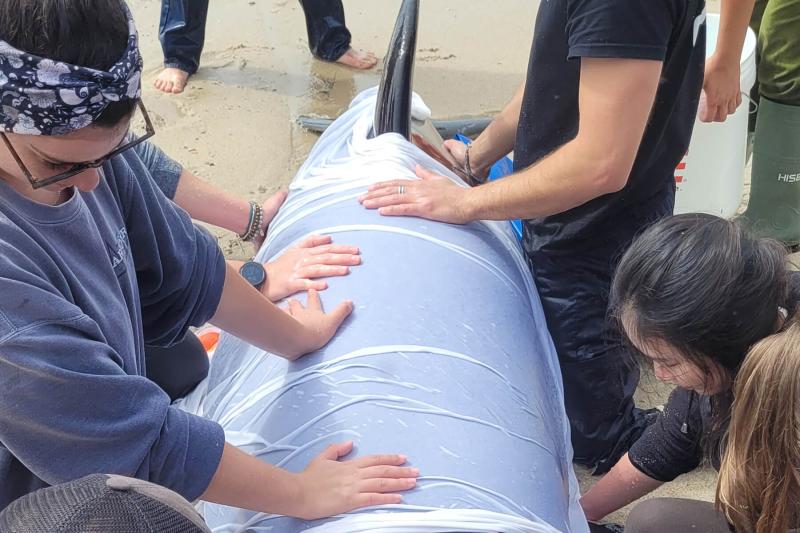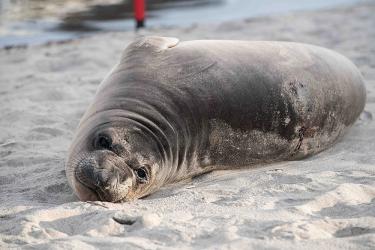Stranding responders tried to save a young killer whale stranded on Carmel River State Beach on the Central California Coast Tuesday. Unfortunately the animal died in transit to a rehabilitation facility in Santa Cruz. A necropsy on Wednesday found no underlying injuries or health problems.
Teams from The Marine Mammal Center, Long Marine Laboratory, and Moss Landing Marine Laboratories combined forces Monday morning to respond to the male whale stranded on the beach. No other killer whales were seen in the area at the time of the stranding.
“The situation was urgent because the animal was under a lot of stress and we’re thankful so many of our partners were ready to help,” said Justin Viezbicke, California stranding coordinator for NOAA Fisheries’ West Coast Region. NOAA Fisheries coordinates the West Coast Marine Mammal Stranding Network, which includes the three responding organizations. California State Parks staff also assisted.
The stranded whale measured about 10 feet long and likely weighed close to 1,000 pounds. It was not immediately clear what subspecies of whale or from which family group the stranded whale came. Several populations of killer whales frequent the California coast.
The stranding was first reported Tuesday morning the whale may have been on the beach for some time before the teams arrived. The stress and physical effects of rolling in the surf on the beach for so long left responders concerned about the young whale’s survival. The first responders kept the animal wet until veterinarians arrived. They examined the whale and determined the best option was to move the animal into a controlled setting so they could better assess its condition.
Team Transported Whale
The team used a sling and heavy equipment to lift the whale from the beach into a vehicle for transport to Long Marine Laboratory at the University of California Santa Cruz. The laboratory was prepared to hold the whale in a designated tank while veterinarians and others determined the next steps. Monterey Peninsula Engineering provided heavy equipment.
However, the young whale died in the vehicle shortly after leaving the beach.
The whale was later transported to The Marine Mammal Center in Sausalito for a necropsy. The necropsy found the animal in good condition, with plenty of blubber and fat and no signs of injury or health problems. Researchers said the whale was most likely less than a month old, as its teeth had not fully emerged from its jaw.
The cause of death was most likely the result of cardiac failure during transport, which will be confirmed with microscopic examination, said Dr. Pádraig Duignan, director of pathology at The Marine Mammal Center.
“Tuesday’s rapid response to the live orca in Carmel was an impressive, collaborative effort among stranding network partners throughout California to provide the best possible chance for this animal to survive,” says Dr. Emily Whitmer, veterinarian at The Marine Mammal Center. “We are all saddened that this animal passed away. Additional diagnostic testing after yesterday’s necropsy investigation will enable us to learn as much as possible about this individual’s health and gain valuable insight into this species as a whole.”
Beachgoers should report injured or stranded marine mammals to the Stranding Network Hotline at (866) 767-6114, while remaining a safe distance from the animal. Viezbicke said the response highlighted the constant coordination necessary to handle marine mammal strandings across the West Coast.
“While we would have preferred a different outcome, we thank everyone who assisted with reporting and responding to this stranding,” he said.



